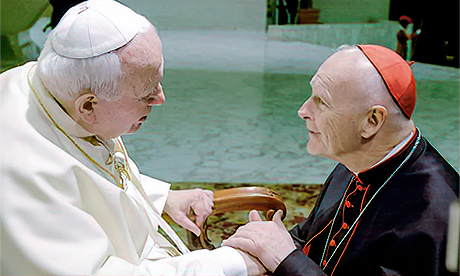A new Vatican report’s revelations that Pope John Paul II disregarded reports about ex-cardinal Theodore McCarrick’s sexual misconduct had Catholics on Wednesday debating the legacy of one of the modern church’s towering figures.
The report triggered questions about whether John Paul was rushed through the saint-making process, and whether the author of contemporary Catholic teaching on human sexuality didn’t understand the complex nature of the topic.
The 450-page report released Tuesday is an unprecedented effort by the church at full transparency, a rare window on internal Vatican decision-making that showed that not only John Paul but also popes Benedict and Francis knew McCarrick had faced multiple accusations.
Each pontiff was aware of different aspects of the accusations against McCarrick, but the initial years of the case came under John Paul’s 27-year reign.
John Paul, who died in 2005 and was made a saint in 2014, elevated McCarrick to archbishop of Washington and summarily to cardinal despite the allegations.
Under Benedict, McCarrick was asked to step down as archbishop of Washington when he reached the standard retirement age of 75 and told to keep a lower profile.
Francis assumed his predecessors had already vetted the allegations against McCarrick, but took action once a credible accusation surfaced involving a minor. McCarrick was laicized in 2019.
Reactions to the revelations about John Paul have been emotional and divided.
Some saw a man perhaps naively believing a scheming friend.
The report’s authors raised the possibility that John Paul’s judgment was heavily coloured by his experience in the Eastern Bloc, where negative propaganda about priests was used to weaken religious organizations. Others felt his decisions were potentially disqualifying for the high moral honour of sainthood.
Vatican’s McCarrick report says Pope John Paul II knew of misconduct allegations nearly two decades before cardinal’s removal
“Saints are holy, not perfect. There’s no chance his canonization would be reversed,” said Kathleen Sprows Cummings, head of a centre on U.S. Catholicism at the University of Notre Dame, who has written extensively about saints.
She added that if the report had come out before his canonization was complete, it would have mattered. “We canonize people for [Catholics], not for the person themselves. But what we know about sex abuse, this is not the kind of person — a person who failed on this level — he’s not to be imitated.”
Others felt the report made the case against John Paul’s canonization.
“It’s almost a bill of particulars against his sainthood,” said Jason Berry, an investigative journalist who wrote a book in 2004 about John Paul’s failure to address the sexual abuse scandal of Marcial Maciel, a Mexican church leader who abused youth and adults.
“He was unwilling to confront the phenomenon of priests involved in sex crimes. I don’t think he thought of it as criminal. He thought of it as a sin, a failing of celibacy,” said Berry.
The report showed that John Paul was among many Catholic clerics in the United States and Rome who had heard different pieces of the McCarrick sexual scandal that critics believe should have triggered further investigation. Instead, time after time, church officials, including John Paul, were often reluctant to probe deeper.
The report showed there was a range of allegations swirling around McCarrick starting in the 1980s, but they primarily remained in the United States, with letters sent to various bishops and priests.
By 1999, New York Cardinal John O’Connor wrote a lengthy letter to the Vatican’s ambassador to the United States, Archbishop Gabriel Montalvo, describing “grave fears” about what might happen if McCarrick, then the archbishop of Newark, were to receive a promotion.
By the time McCarrick was appointed to lead the D.C. archdiocese, John Paul’s assistants had told him that McCarrick would share a bed with seminarians, that anonymous letters accused him of paedophilia with young relatives and that a priest accused him of “attempting to engage in sexual activity,” the report said.
The priest was later diagnosed with psychological trauma.
To some readers, those allegations, while serious, didn’t add up to a “smoking gun” against McCarrick, who swore on his office to John Paul that the reports were untrue and that he’d never abused or hurt another person. John Paul was guilty only of being too trusting of a man who fooled and charmed Catholics around the globe. Continue reading
